
Бесплатный фрагмент - Life and Science. Popular exposition
Dear Reader! If you are fond of science, technology, psychology and politics, I strongly recommend reading this book. Young in spirit, very well if also in body, the researcher will find here the results of practical experiments and schemes of experiments to be performed. You will learn that the past lives here and now, it acts on the present and has not gone anywhere. Light can be “fast”, “slow” and even “zero”. Nature not only isolates, but also copies objects, ranging from microscopic particles to quite tangible objects. We can and must take its methods to serve ourselves (and humanity). Biology, psychology, history, even politics – everything obeys the physical laws of separation and conservation.
The high-order energy does not decrease to an overall uniform background. She returns to the world in a completely natural way, without complicated instruments and devices. These are not just beautiful arguments, but workable schemes and formulas. Take them and put them into practice.
At the end of the book you will find out why all this is needed …
Light of Time
Protests of everything when everything goes according to plan. Scientifically

No gag! Pure dispassionate science. Are you ready to know the abstruse truth?
…The meaning of a series of physical experiments from the author. Check the influence of one experience on another, similar to it, but not associated with it in a visible way. Is there a time trace, noted by some other researchers?
In the simplest, but also the most obvious form, the course of action is as follows. Here, 20 exactly the same galvanized plates. There is a bottle with hydrochloric acid solution. Pour acid into the burette. Let’s dip a plate into it. For a strictly defined time. At the end, we fix the result with a camera. We wash the container thoroughly. Pour the acid again, and dip the next plate. So over and over again, all 20 metal rectangles.
What turns out?
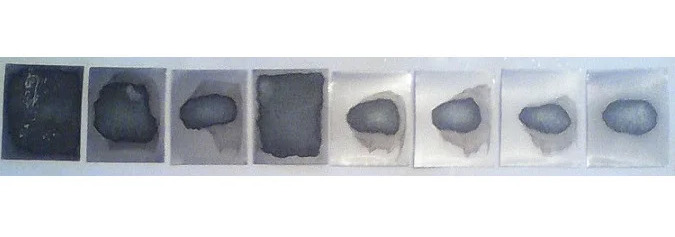
The first experience is the most powerful reaction. Then a decline and a short-term rise. Which, however, no longer reaches its original value. This “second breath” is followed by a series of approximately identical results with a low reaction intensity.
You can increase the level of interaction by moving the burette a meter or two to the side. Within the home laboratory. The initial peak, slide, and subsequent plateau will reappear. Eventually the change of scenery stops working. It is necessary to drastically change the conditions of experiments or wait for two months, when something in the surrounding space will change by itself.
The moral of this research is this, friends. It doesn’t matter what is repeated — the interaction of reagents, germination of seeds, or day after day, year after year, existence under the leadership of one leader. In Nature itself, there is a mechanism for the extinction of the reaction during its multiple monotonous repetition.

If the salt loses its strength…
…So, the doctor prescribed a medicine for you. You are taking a course. It’s getting good. After some time, you decide to repeat the success yourself, and you find that the effect is not at all the same. No initial desired action!

What’s the matter?! You go to the doctor for the second time and state your upset feelings. The doctor, wiggling his fingers, prescribes another drug for you. The effect is essentially the same, but with a slightly different composition. So, little things. And the packaging is different… Here, and this medicine again makes an impression on the body. Until it “weakens” again.
“What’s the matter?” You ask a medical professional. “Used to” — the successor of Avicenna’s case will smile. That’s all the explanation. Details should not be expected.
You will not get them from the luminaries of science, gray-haired academicians. “Addiction”. The conversation is over, go. What is addiction, its subtle visual mechanisms, chains of impulses, memorization at the level of molecules is not explained. Do the atoms themselves involved in chemical reactions “get used”? Are biological molecules tired of boring monotonous work? What?
No answer.
So what I’ll tell you… My experiments represent the essence of this phenomenon at a purely physical level. Addiction is also relevant for simple chemical reactions. It works not only in biological objects. And all this is easy enough to check…
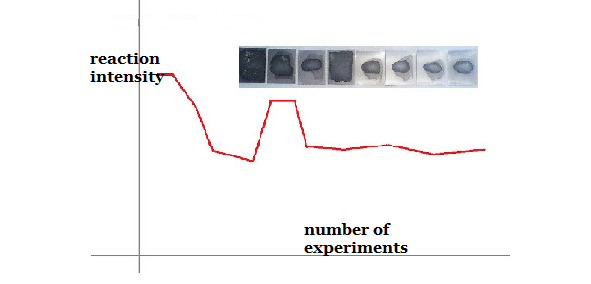
We have already gone through this, dear friends. Galvanized plates, or something else like that — all the same. The first experience is the most powerful reaction. To be precise — the maximum yield of the product (gases), but these details are not so important. After two or three experiences decline, and again rise. Which, however, does not reach the initial level. Recession. An extended plateau of approximately equal low-intensity reactions.
Do you understand the essence?..
I was shocked by experiments with crystals of hyposulfite (or, indeed, sodium theosulfate). Here, the factory packaging, a kilogram of something that resembles granulated sugar. Divide into portions of 100 g. Heat in a water bath, melt. We leave to “freeze”. The first two or three experiments are all like in textbooks. Melts-crystallizes. And then — all new portions of hyposulfite simply flatly refuse to crystallize. And with melting too — inexplicable oddities.
You can restore the status quo by moving the burette with acid or crystalline solution a meter or two within the home laboratory. However, over time, the permutations cease to work. The “slide of reactions” system — the decline is replaced by chaos. It is necessary to wait, sometimes quite long (a month or two), for the atmosphere to clear itself of the pressure of the past.
The extinction law of the reaction is clearly visible in a series of experiments on sugar fermentation. And in seed germination. On pure hydroponics. The first shoots are the most powerful. Two or three repetitions — decline. Climb. What’s next, dear readers, I just didn’t have the strength and time to find out in detail.

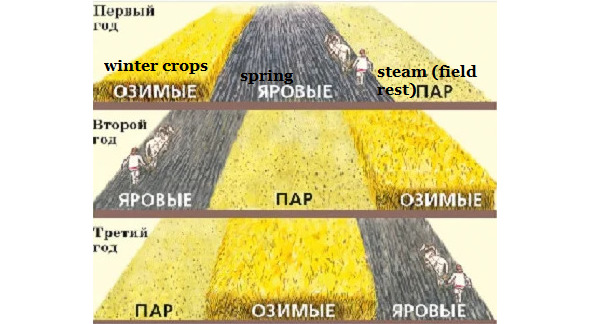
This suggests a parallel with the “steam” method, which is widespread in agriculture. For two years the field is taken out of circulation, so that it “rests”. But what does “rested” mean? Fertilizers fly into the soil from the air? The mechanism for the return of fertility is nowhere clearly clarified. What can bacteria restore? I suppose my experiments with the (temporary) extinction of reactions may be quite useful to farmers.
And to you, dear reader, too. Well-known medicines no longer help you? Change your diet, habits, clothes, home decor. Step aside. Try to take the medicine in other forms… for example, simply dissolving in water. And… maybe it will help. Then — let me know!
Why doesn’t nature like to repeat itself?
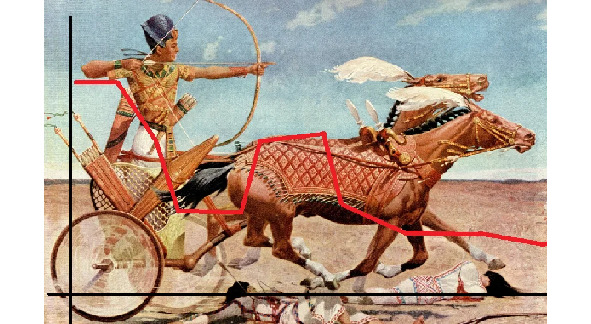
…We continue the topic of experiments on the time trail, which has gained a kind of popularity with a seasoning of political news in Belarus.
…A series of identical repeated experiments (chemical, biological, scheme, pattern of any actions) leads to the fact that the force of interaction between elements weakens. In the first variant of the naming, this is the Law of Reaction Fading.
You are interested? Would you like to summarize? In a previous publication, experiments were mentioned with seeds germinated in one substrate, on water. Crops are not visibly related to each other. Moreover, only that they are produced in one relatively small area of space. The same picture. First sowing — lush seedlings. Extinction. Ascent that does not reach the original level. Deep recession. “Stabilization”. I did not begin to find out further regularities, because each germination up to the height of stalks of 8—15 cm takes two weeks. But, there is something here.
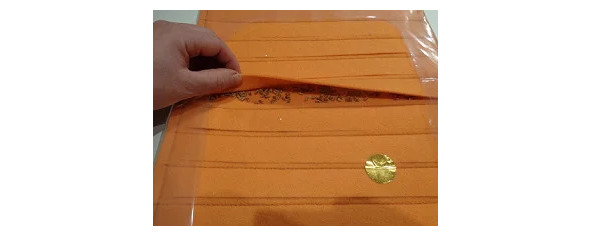
Water-soaked technical felt substrates are used. The substrates are changed every time, but the germination of a new batch of seeds (from one package) is carried out in the same place in the room.
Similar results are revealed in experiments, hmm, in the fermentation of sugar (the volume of carbon dioxide released) and with the rate of crystallization of hyposulfite.
And here is the feature. It is possible to restore, at least partially, the strength of the reaction if the place of the experiments is changed somewhat. Or — to radically change the decor of the room. Or — just wait a long time for some kind of change.

To generalize is to generalize. Although, if we draw bold analogies, it becomes a little sad. Hence, any peaceful civilization is simply doomed to extinction. Here you are, a farmer. Plowed in the field. Not so much bothering yourself. Somewhere let’s say in Mesopotamia. Or Ancient Egypt. Fascinating birdsong… They plucked a handful of dates and ate with pleasure. We caught a fish in cool clear water. A lovely wife prepared a delicious dinner. We ate fish with appetite, drank some sweetish hake beer, and…
The flow of love is power
Carries me to you
Swim quickly my dear
Swim to me soon!
Herons walk in the river
Bare breasts, no restraints
Transparent water drops
How lotuses bloom
You hold my hand
And around — flowers
I am yours, without a sound
After all, my dear — you
(Ancient Egyptian poetry, free translation by Gena Cher)

…Day in the field, the second. Summer replaces autumn, another year. Everything is according to a measured schedule. Things are good. But — the same thing. There is no change. Here, however, my wife, like something, began to shout at you. You drink your favorite “hake” with saffron, 12% on the banks of the Nile, but… there is no former relish. Should we try to increase the fortress? The river flows and flows. She no longer speaks to you with the voices of sacred crocodiles and naiads. Fish tastes like papyrus. The flow of love in a general sense dries up.
Here is a new generation, as it is already obvious, without the former excitement. Boys are not particularly interested in girls. Girl and girl, nothing like that. And on the other hand, the same reaction. None of these young men are lions, but just donkeys, it’s good if they have silver bars in their luggage. I want something new… but where can I get it? After all, it was said by wise scribes and by Pharaoh himself, how our ancestors lived, so let it always be afterwards. Our goal is stability!
And everything around goes to the extinction of all kinds of reactions. Yes, now, almost it has come. Jumping off the pyramid, for the novelty of sensations?
But now… from the side of Assyria, or the previously obedient country of Nub, a storm is approaching. Swords — lightning, shields — thunder. The settlements are compared to the desert. Everything gets mixed up. Everything is changing.
And is reborn.
…At the same or even the highest level of reactions:

The sun rises and sets
And in the desert there are mirages
What’s happening to me
Stupid heart, tell me!
You are racing in a chariot
My beloved hero…
I want to merge with you
Late sometimes!
In the meantime, I’ll paint my eyes
For you my soul
I will lure you like in a fairy tale
Quietly, slowly…
Time Machine for the Poor
We have found that repeated actions, chemical reactions, biological processes somehow cancel each other out. A banal constant, the force of interaction between the atoms of the reagents in a series of independent identical experiments, decreases markedly. It is convenient to extrapolate the results to different things: … from setting rural fields to “fallow”, to restore their fertility, to the principles of the extinction of civilizations.
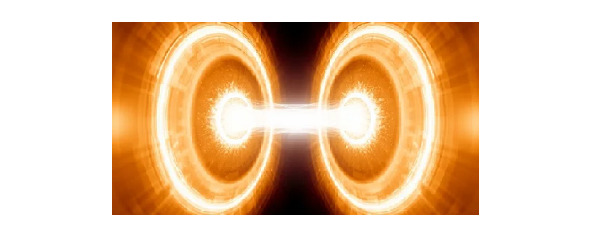
Let’s go straight to the complex. Identical forms interact not only in time but also in space. Here and now.
A very simple outwardly experience. Two burettes with ink solution. We saturate A4 paper sheet with clean water, carefully put it on the surface of the solution. Not very fast, the ink diffuses to the surface. At this moment, they are very sensitive to any impact. If a certain field slows down or accelerates the force of intermolecular interactions, it will become visible on the surface.
Also, put a “label” on this sheet. It can be a small plastic triangle, rectangle, pentagon. At this point, the diffusion rate obviously changes.
Next to the burette “A” we place exactly the same container “B”. With a sheet. But already without a label.
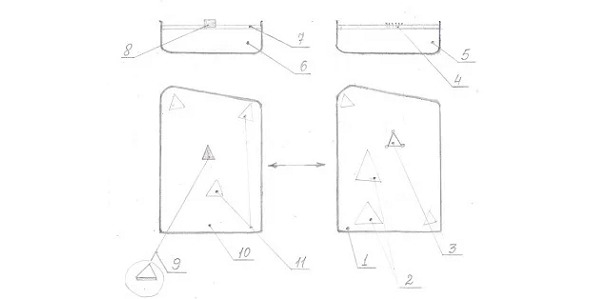
1. form B
2. reflections of the mark in the form B
3. brightest reflection of the mark in B
4. development of the reflection of the mark on the membrane, side view
5.ink solution B
6. form A ink solution
7. мembrane Form A
8. “mark” on the membrane
9. “mark” on membrane A, top view
10. form A
11. reflection of the mark in the form of A
The experience starts. An hour later, the outline of the mark appears on sheet A. In other places. Which, obviously, repeat in their properties the area adjacent directly to the label.
And, similar outlines appear on sheet B. Yes, action at a distance. Scientific magic. If you like, quantum teleportation is for the poor.
The first experience is the clearest. He delights the soul of the experimenter very much. The second one is so-so, but it is also good. The third is practically nothing. Fourth, we begin to worry, rush, and reproach ourselves for imaginary negligence. But that’s all right. The more one experiment is similar to another, the more they are related. It does not even matter whether such an attitude existed in the past or exists now. In general, the pileup of “souls” of the same experiences in one place smears the results in the present time. The law of extinction of reactions is only a particular manifestation of a much more interesting and extensive System of interaction of similarities in Space of Time.
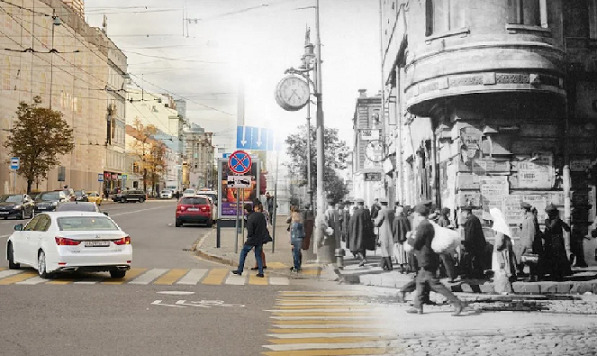
“And there is no more time”
A series of repetitive reactions according to the same scenario tends to fade away. These reactions include almost everything — from interactions of atoms to biological cycles. The first result is maximum, decline, rise, decline — and a plateau of monotonous low-intensity reactions. The past affects the present. Action is aimed at blurring the results of the next similar Phenomenon.
Are you yawning already? Then a short spoiler. What is the meaning of research?
…If we unravel the mechanism of this action, then… We will be able to see the Past itself. Time, in its entirety… Or even materialize the necessary fragments of it. Modeled after the present. A pleasant bonus is the victory over aging.
Do you know what the Pauli principle is? We open our beloved Wikipedia. “Pauli’s principle can be formulated as follows: within one quantum system in a given quantum state there can be only one fermion, and the state of the other must differ by at least one quantum number.” Fermion is all atoms of the periodic table. In addition to helium, and even then, at temperatures around absolute zero.
The Pauli Prohibition principle in human language sounds like this. In one atom there should not be two completely identical particles, in one molecule, in a cluster (speck of dust) … The dimensions of a “quantum system” are simply not defined by physics textbooks. The mechanism of repulsion, or even rejection of complete mutual similarities is not considered. So it is, that’s all. Leave me alone. Let’s not go into details…
Two separate identical macroscopic objects also have the same set of energetically identical microparticles. Is it okay that I used the same words in one phrase? This is prohibited by the rules of the literary language. Each atom of, say, our galvanized plate can be opposed to a “forbidden” atom from another plate. Inside them, there are initially no completely identical microparticles.
What happens if you connect two identical material objects visible to the eye? Explosion? Annihilation? Warm, but not quite. Let’s postpone this question for another time. Now let’s try to reverse the Pauli exclusion principle along the vertical. In quantum mechanics, not that is allowed. So, in our opinion, it is forbidden to find identical objects not only in one small area of space, but also in time. It is possible to show some dissatisfaction of the Space of Time with the repetition of the past, for example, if one reproduces the same reactions without leaving the place. Chemical or biological, not much difference. The past suppresses the present according to the schedule you already know:
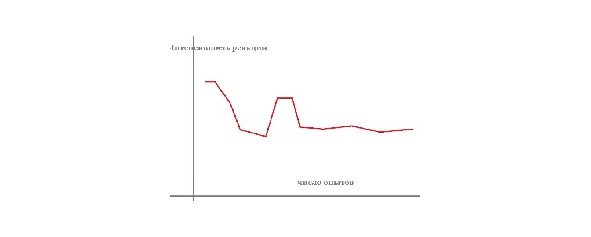
Did you understand? By performing a physicochemical experiment, we can find out for sure whether a similar experiment was put here before. A certain complication of the research scheme makes it possible to determine some of the distinctive features of the object that was in a given place.
This is a victory over Time

The past is in the present. Or — zero speed of light

In addition to the modernized Pauli principle, there is another variant of the development of ideas about the mechanisms of memorizing the Universe of the events that took place in it. Perhaps they are the same thing, only a side view
…The paradox, dear friends, is that the speed of light is constant and non-constant at the same time. How can this be?
Our eye sees predominantly in a narrow yellow-green spectrum. A certain length of light waves. Infrared range. Ultraviolet — no longer. We know this and do not complex about it. Our capabilities are complemented by special devices.
And this does not mean at all that light with wavelengths greater or less than the yellow-green part of the spectrum does not exist.
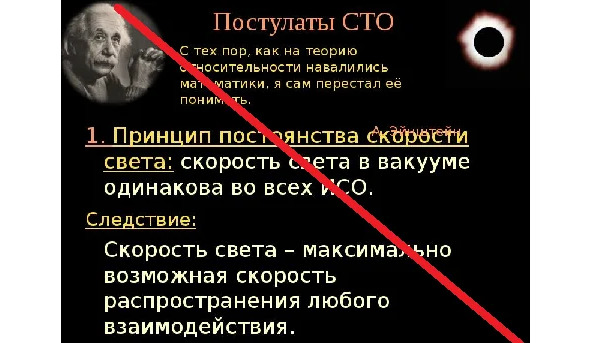
The same is true for the speed of light. Here, not only the eye, but also most of the known devices cannot “see” light, the speed of which differs from the standard value “C”, three hundred thousand kilometers per second. Particles of light, photons, they are sometimes waves, pass through them unnoticed. Energy levels do not match. All this correlates perfectly with the well-known laws of physics. This state of affairs is illustrated by the almost everyday Mössbauer effect.
…By and large, the constancy of the speed of light is very necessary for quantum mechanics. Without it, Maxwell’s basic equations simply refuse to work. But this decision may well resolve the paradox and allow one to move towards new horizons.
Thermal imagers, X-ray machines, and other devices that operate with beams of different frequencies are useful and important. Well, is that all? Imagine now that we are entering a fundamentally new line of devices that allow you to see “fast” or “slow” non-standard light. That’s quite possible. You just need to know how.
And what will we see?
Frozen near objects, light clouds emitted by them. Light with a speed of zero, or near-zero relative to the atoms that emitted them. Reflective body structure. Weak, specific, but affecting rough matter. And I, dear friends, will once again allow myself to use a tempting picture. A vision of an ancient sailing ship on the site of a dry sea. Who Said Science and Feelings Can’t Be Together? Like two equal wings of a bird…

We continue without a break.
According to Einstein’s postulate, the speed of light is constant. It doesn’t matter if a cyclist has a flashlight, as shown in the pictures illustrating the Special Theory of Relativity (SRT), on board an airplane or a starship. No matter how you measure, you will get the same 300 thousand kilometers per second. The wavelength will change, you can say the intensity of the light. But not speed.
Question: who checked it? There are space observations. The images of stars revolving around their axis, floating in the abyss of space, are not blurred, which means that light has the same speed. Otherwise, the “slow” and “fast” light from parts of the stars with different speeds, instead of a shining point, would show something like a comet.
But Cosmos is Cosmos. And you prove something within the terrestrial laboratory. The Italians of the OPERA group in Gran Sasso have already shown that something is not good with the theory of relativity. Lightweight neutrinos easily exceed the speed of light.
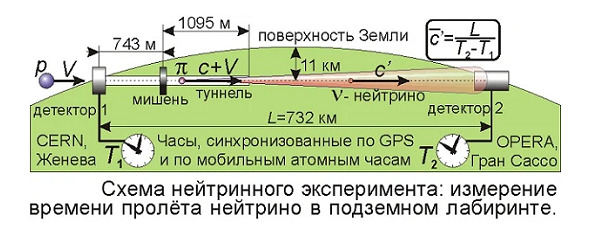
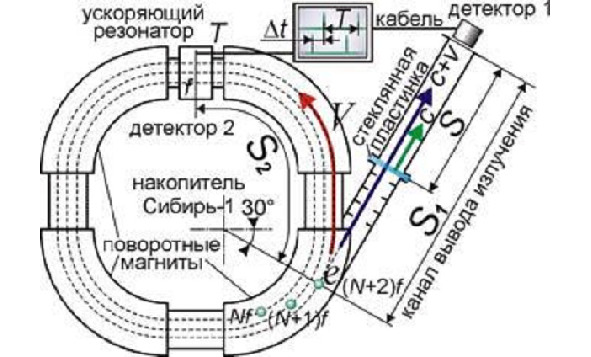
Here’s another experiment. It was held in Russia. The results are presented by the journal “Science and Life”, No. 8, 2011. Already something, in my opinion, is close to the truth. But, not really. Here is a particle accelerator. The particles spin at tremendous speeds (in one direction only) and emit light as they move. This accelerated light is diverted into a special window and… what do you think? Is its speed measured directly? This is quite possible in this experiment. Not at all. Experimenters introduce a glass plate into the path of the beam, and thus prove that the speed of light does not change when passing through a screen (analogue of ether?).
For what? Everything is much simpler.
Long before that, the author was involved in measuring the speed of light, “pushed” by microparticles. Normal white light bulb. There are those in your work. Ions rush in it at a speed that can be compared with light. With the help of a diode, we make the particles fly in one direction of the tube, then in the other. I don’t have superfast sensors and high-speed oscilloscopes. Therefore, we simply project the image of the lamp onto the screen using a pinhole camera (a hole in the shield). If the quanta have a longitudinal velocity component, the image should shift. And so it happens.
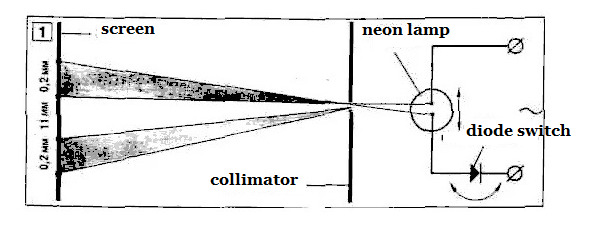
For those who love details. Based on the articles of the author in the journal “Tekhnika-Molodezhi”, No. 10, 2001, and No. 3, 2002.
“… In a household fluorescent lamp, the plasma temperature is on the order of tens of thousands of degrees. This corresponds to the motion of charged particles with a speed of about 1000 km / s. The photons emitted by ions flying with a speed V must have a speed C + V directed along the axis of the lamp parallel to the screen, in accordance with the classical principle of adding speeds, and not with the SRT formulas. If so, the spot will move in the direction of the movement of the ions emitting light. If the second postulate of SRT is true, there will be no displacement. I am using a neon lamp with a glass shell that is transparent to UV radiation. The light from the emitter passes through a narrow diaphragm and hits a screen located parallel to the plane of the emitter electrodes at a distance of 0.8 m. The direction of the current can be changed using a diode. An image of a lamp appears on the screen… When the direction of the current changes, it shifts in the direction of ion movement by 11 mm. This means that the speed of light C is added to the speed of movement of the source V according to the “ballistic” principle. According to indirect estimates, the ion velocity is 2000 km / s. This is in good agreement with the experimental results. Therefore, either the second postulate of SRT is incorrect, or its meaning needs special clarification.
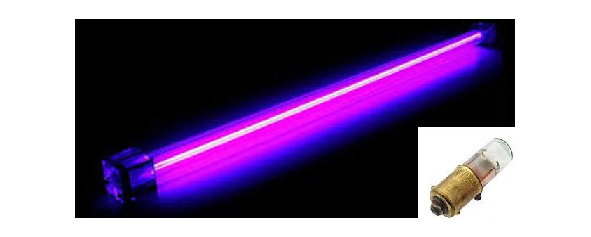
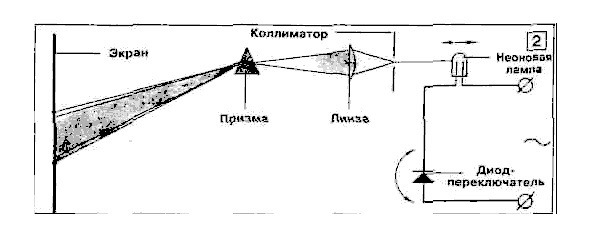
As they say, to seek is to seek, and therefore I set up a second experiment with a neon lamp, changing the conditions. The main element is now a prism that deflects light rays of different wavelengths in different ways. If the speed of light is greater than C, the spectrum shifts towards the violet side. If less than C, a “redshift” occurs, as when observing a receding radiation source. And this is not the Hubble effect. I place the neon lamp so that the plane of the electrodes is perpendicular to the pinhole screen. When the lamp is turned on, a spot of light appears on the screen. After polarity reversal, the beam is shifted by 24 arc minutes. Using the well-known formulas, we calculate that in this case the change in the speed of light is 520 km / s, with an error of 85 km / s.
I draw your attention to the fact that the change in the refractive index of the prism due to the different speed of the photons in the ray incident on the glass is usually masked by the property of the refractive medium. The refractive index, precisely because of the differences in the speed of quanta in vacuum (air), depends little on color, and is abnormally large. This experience is based on rather subtle assumptions, and does not have sufficient clarity. It would be more correct to use two low-inertia photosensors placed along the pulsating beam and connected to high-speed oscilloscopes. Reversing the polarity of the lamp would reveal the whole truth, which of the rays flies faster. Once and for all. The author does not have such tools.
Search for ether. Search everything
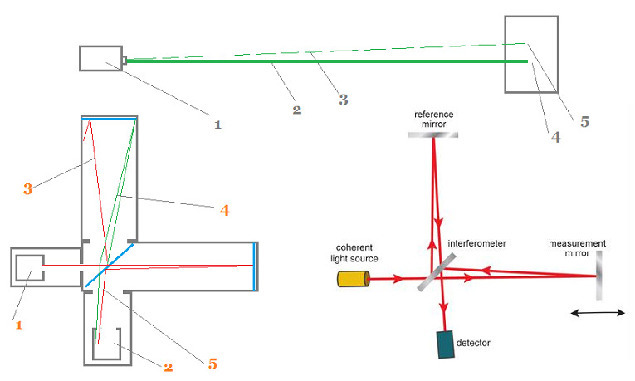
…Does ether exist, this kind of ocean in which light waves roll? And, as we assume, keeping the shadows of the past quite fresh, forever? Let’s bring a revision of physics. Michelson-Morley interferometer. The beam is divided by a translucent mirror. One of them goes towards the stream of ether, then back. Its speed changes. The second is perpendicular to the flow and therefore serves as a standard of speed. If the speeds do not match, the interference pattern will change. In the figure below on the left, the author imagines that the position that the rays pass strictly perpendicular paths is incorrect. During the stroke along the arms of the interferometer, the rays are deflected by the ether stream. The detector receives waves initially deflected towards the ether stream. The scheme for constructing a real interference pattern is much more complicated than Michelson’s drawings. In addition, according to the reasoning about the Mössbauer effect, only light with a “standard C” speed of 300,000 km is clearly observed. from. Figure above the interferometer. The author’s experience. The deflection of the laser beam, presumably due to entrainment by the ether. If the ether is carried away by light, with the specified parameters, the flow velocity of the medium is 100 km. from. This value is in good agreement with the speed of the Earth’s revolution around the center of the Galaxy, 200—220 km. with.. Why didn’t you notice earlier? When operating laser communication systems, the system is “zeroed” automatically or manually. This rule is considered the norm. A more plausible explanation. During the day, the air in the room where the experiments are carried out warms up. The air lens distorts the beam.
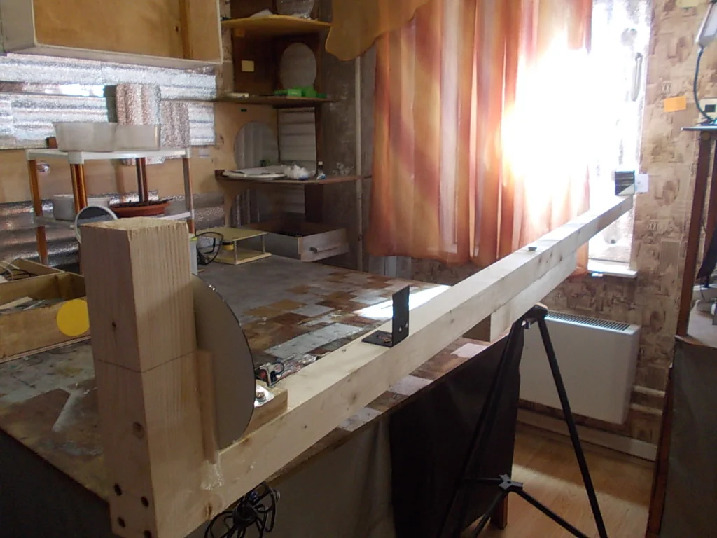
…Several years later, I decide to repeat this experience. The deviation of the beam obtained in the preliminary sample is large enough to try to create an “interferometer for the poor”, with the ability to change the direction of scanning the ether manually. On a massive bar, parallel mirrors and a laser sight are placed. The length of the beam reflected twice is 6.5 meters. It is inconvenient to turn the device and observe the change in the position of the beam at the same time. To record the results, an electronic camera rigidly fixed on a bar (not shown) is used.
…First, we reproduce a stationary experiment. We send the beam not to the lens, but to the laboratory wall. This increases the length of the light path to 10 meters. It all fits together. After 5 hours, the light spot shows a new position, 4 millimeters below. It is alarming that after a day, that is, the Earth’s rotation around the axis, it does not return to its original mark.
We pass to independent turns of the “interferometer”, without the help of the planet.

The action takes place late in the evening. The first picture, a scan of continuous video filming — the beam comes from the East (although it changes direction twice more, reflecting from the mirrors). The above images do not show the mesh imposed by the Point editor. However, I see that the vertical line formed by the beam in interaction is likely to shift with the optics of the camera. From the series of scans, for demonstration in the book, we select the most characteristic ones. East, North-East, West, East again. The beam takes on the greatest brightness when oriented to the West. The only reliable, well reproducible result that is not ashamed to present to you, dear reader, is the brightness of the glow.
We can exclude mirrors from the experiment and get a kind of elementary optical pair. The beam only goes in one direction. The result is the same.
…Indeed, propagating against the ether, or along the flow, the light accordingly loses and gains energy. Changing the direction of the beam is more difficult. Although it also exists.
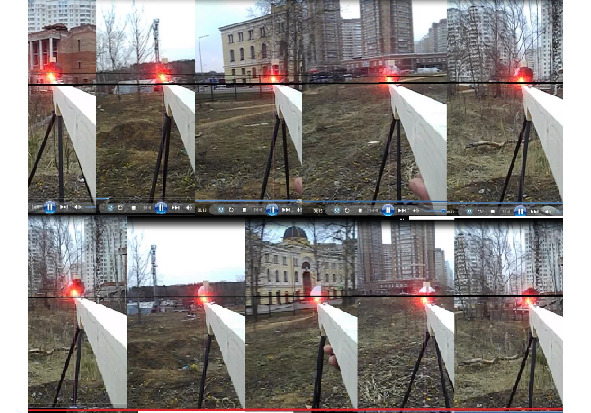
…We go out into the fresh air and continue our experiments. Some researchers believe that the ether can be slowed down, and completely brought into a state of relative rest, by such an obstacle as a simple window glass.
The result is the same in both cases. Within a few minutes after switching on, the laser beam goes down by 1, 5 — 2 millimeters.
…All this, coupled with the oddities of the device settings, which would take too long to talk about here, leads to the idea that one should look for the reasons elsewhere. To do this, you need to take a step aside.
Searching for light. Step to the side
The basic idea is that the laser beam experiences a kind of attraction from a plane-parallel surface. In this case, the surface of the bar. Or the floor of the room. And with gravitational attraction there is no kinship here.
Physics textbooks initially have serious questions. What is the width of a visible light photon? Officially half of its wavelength. That is, two ten-thousandths of a millimeter. However, light is deflected by interference gratings and just tenths of a millimeter holes. The difference is a thousand times. What makes a photon feel the presence of atoms at the edge of an obstacle? What long-range action do these forces have? Has anyone checked whether the photons are deflected by the edge of the screen, located at a distance from the beam one millimeter… centimeter, or maybe a meter? Does the interaction take place right away, or does it take time for preliminary adjustment of light and matter?
As said, these experiments are a step aside. They were carried out without enthusiasm. But, nevertheless, they gave food for thought.
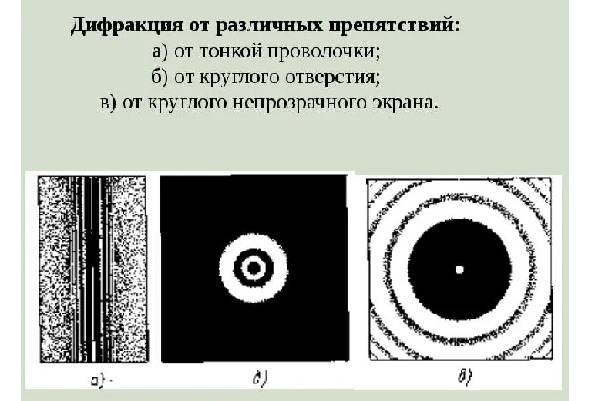
…Most of all, when preparing for new experiments, I was interested in the nature of interference. How so? Do light waves collapse in superposition? Are they annihilating, or what? Physics textbooks tell about this rather vaguely. No, they do not disappear. The energy conservation law is in order. The strength of the waves from the dark part of the screen appears in the light one.
Once again, comrades academicians — sorry, we did not understand. Here, these are your drawings. The course of the electromagnetic waves is clearly shown here. They are in the dark zone — there are! But they are not visible. From the word “absolutely”. Where did they go?
And the fairy tale about the white bull begins all over again.
Leaving aside the subject of long-range action of the edges of obstacles for later, I decided to take a closer look at the interference.
…The paradigm of modern science — light and dark zones of the interference pattern are formed by superposition of electromagnetic waves. There are serious questions here (see above). Why not imagine that the edges of objects themselves distribute the light in their chosen directions? Well, or, forgive me, the clouds of ether accumulated near them. In bodies there is a discrete distribution of microparticles — elementary emitters. They can deflect the beam in selected directions, creating only the appearance of interference. Is there nothing to do with classical superposition?..
The first thing that surprised me when I took up the experiments was that light not only bends around an obstacle, but also repels from it. The books confirmed what had previously slipped past consciousness. The edge scatters light in all directions. Which is quite consistent with the hypothesis of a material beacon that sends out photons in the chosen directions.
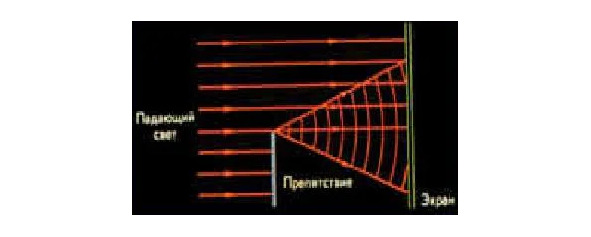
Now carefully, dear reader. We create screens from various materials, expose them to the beam and observe the interference pattern. According to the above calculations, the picture is made up of the interaction of lighthouses. The edges of the objects “agree” in which directions the light should be emitted. There are zones in which to send photons, according to the law of conservation of energy is prohibited. If the screens are made of different materials, the “interference” pattern they create will be different. Or it won’t be at all. These transmitters operate at different frequencies and therefore cannot match the light distribution.
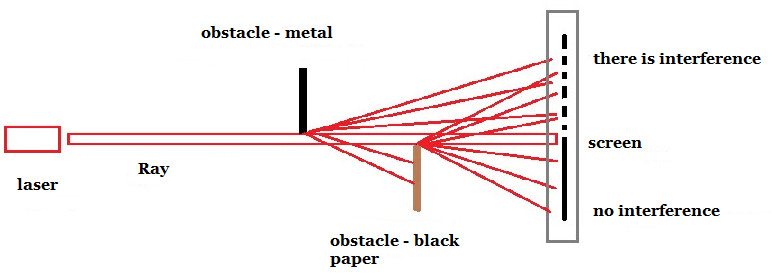
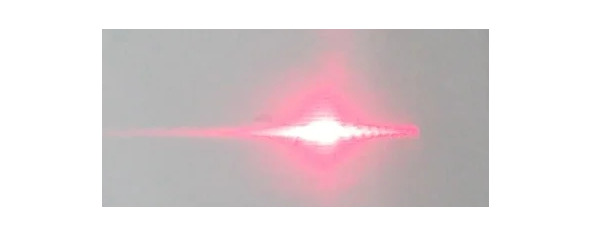
…No differences were found in the patterns of interference fringes when screens made of different materials were combined. The hope was for a complete, even demonstrative absence of interference lines in the area of overlapping “dissimilar” rays. It was not possible to identify differences in the distance between obstacles up to 40 cm. Presumably, the distance at which our “beacons” stop communicating with each other is too great for a home laboratory…
…The interference from the edges of opaque liquids was investigated. And in this case, the interference pattern is formed clear, and immediately.
Interference at the boundaries of biological objects, from slices of root crops, such as potatoes, apples and beets, has been investigated.
The classical principle of interference as a superposition of electromagnetic waves confirms its reputation.
But it is not exactly

…Dear reader! In this book, the experiments are presented as if the author performs them in order, in accordance with a certain, previously prepared scheme. This is not true. All life, including science, is a mixture of assumptions, experiments carried out at different times, combined for the convenience of our reading. The experiment described below was carried out one of the first, in the mid-1990s. Even then, my youthful curiosity was tormented by the question of where the waves crossed in antiphase go. Air, water or electromagnetic — in general, it doesn’t matter. So where?
Not finding the answer in various kinds of manuals in physics, the author turned to experience. He was not alone in his doubts. This, perhaps my first article was published. I present the revised version.
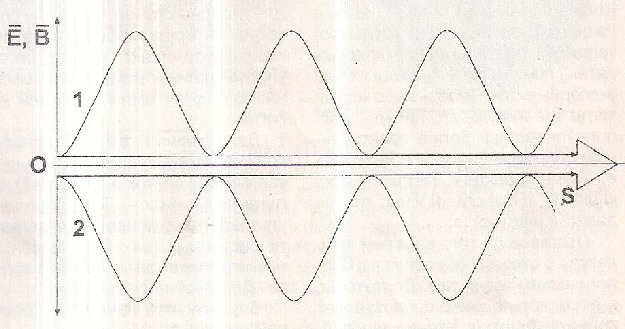
So friends, let’s imagine that we took two single-color beams from good lasers and crossed them at a negligible angle (see Fig.). In antiphase. What should happen in this case?
The light… will disappear.
Logically, this is how it happens. But physics is above linear logic. Moreover, it is even higher than higher mathematics. Material objects do not at all want to be added, subtracted and multiplied in some way. They are what they are. And with this, as well as with the temper of a capricious wife, given to you forever, in joy and sorrow, you have to put up with.
The measure of truth is a natural experiment. Therefore, having swayed a little, I proceed to physical experiments.
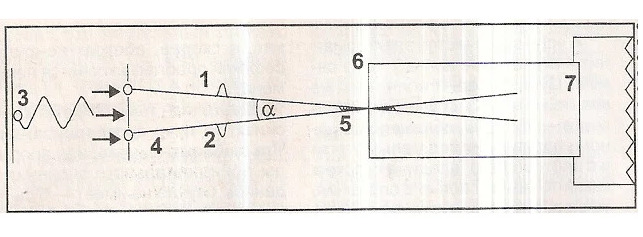
Take a look at the picture, curious reader. Number (3) indicates a source of coherent light, a laser pointer. (4) — diffraction grating. Here the light is split into many coherent rays. If you put a piece of paper in the path of this mixture, we will see a speckle. That is, a set of black and white (or, indeed, red and black) dots, similar to what we see on an unset TV screen. In the black areas, according to textbooks, the crossed beams (1,2) are added in antiphase. And, therefore, they disappear for a while for the world.
What if, in such an invisible state, light completely ceases to interact with gross matter? In particular, with hitherto impenetrable screens? Having passed the prescribed paths without any extinction, the rays go out of each other and appear to the astonished observer as if emerging from the void?!..
…We charge the camera (7) with a film of 400 light sensitivity units. Instead of a lens, we have a tube (6). The obstacle in the path of light is metal foil. We turn on the laser, open the shutter for a few hours. We expect that the paired rays, having overcome the screen in the region of space (5), will disperse inside the tube and illuminate the photographic film. It would be interesting. Something like an X-ray with light in the optical range.
But the miracle did not happen. Photos turned out without flare.
…The beams do not stack in antiphase. One wave with its “top” does not close the “bottom” of another. Where there is darkness, there is simply nothing. Physics textbooks indicate something like this, contradicting themselves, and not revealing the essence of the phenomenon.
Let’s try to formulate the unsaid.
The rays, or what looks like that, are distributed in space by the diffraction grating itself. It is this wonderful set of identical “rods” that decides where the light will be and where the darkness will be.
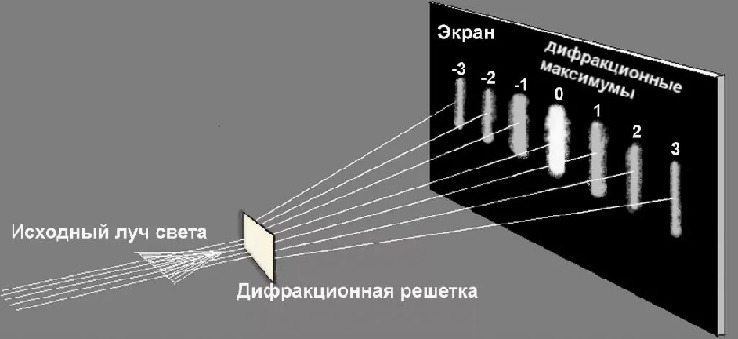
Бесплатный фрагмент закончился.
Купите книгу, чтобы продолжить чтение.
